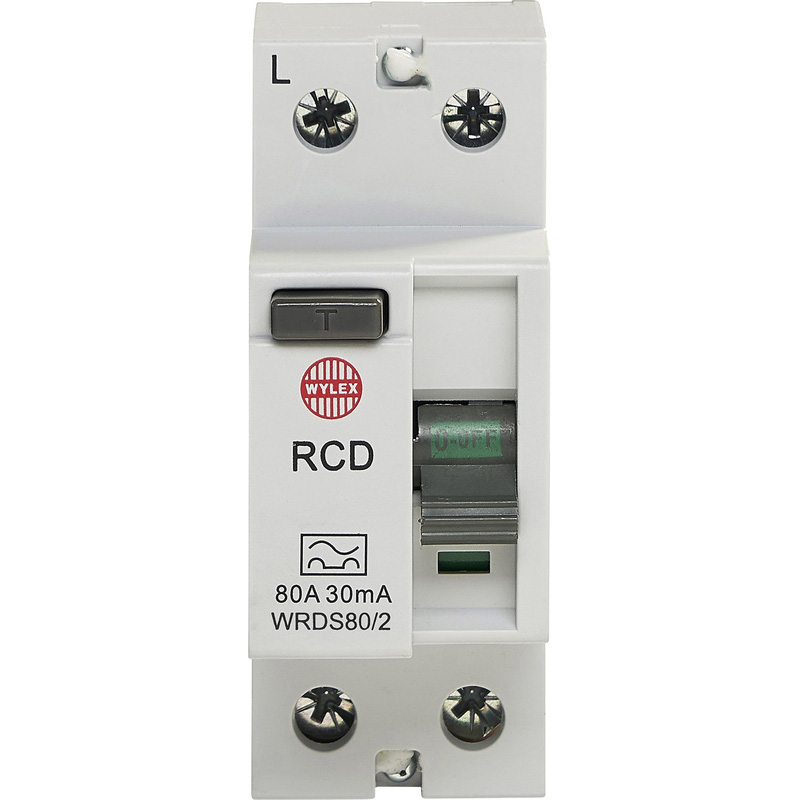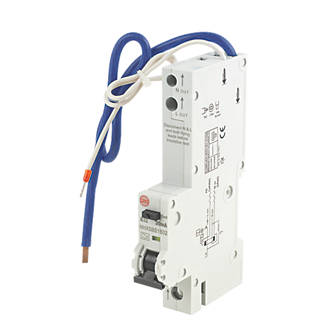Pressure washer trips fuse?
Discussion
The problem is, the stall (or starting) current of pressure washers is huge - like over 20 amps for a split second. This is fine for traditional fuses that 'blow' due to heat in the fuse wire that eventually melts and breaks. In an MCB you have a bi-metallic plate that heats up in an overload situation. Like a fuse, it eventually trips the latch braking the supply. But as an added safely benefit (compared to fuses) you also have a coil inside the MCB that trips the latch by generating a magnetic field if the current is strong enough. My guess is the pressure washer stall current is going over 16 amps (highly likely).
Dr Doofenshmirtz said:
The problem is, the stall (or starting) current of pressure washers is huge - like over 20 amps for a split second. This is fine for traditional fuses that 'blow' due to heat in the fuse wire that eventually melts and breaks. In an MCB you have a bi-metallic plate that heats up in an overload situation. Like a fuse, it eventually trips the latch braking the supply. But as an added safely benefit (compared to fuses) you also have a coil inside the MCB that trips the latch by generating a magnetic field if the current is strong enough. My guess is the pressure washer stall current is going over 16 amps (highly likely).
I've got a proper 3HP industrial pressure washer connected via a 16A commando, protected 16A Type B MCB and further protected by a standard 30ma RCD - I've never had problems with tripping in 20 years.From the O/P posts it's not really clear if the RCD's are tripping or the MCB's are tripping or the RCBO's are tripping - because the OP and many of the contributors are using the word MCB and RCD's interchangeably when they are different.
This is a 10A type B MCB - These come in different current ratings and curves B,C,D

Almost all Domestic installations use a type B, changing to type C or even D allows a higher initial surge - but as Smiler pointed out above, you need to check your earth loop impedance to make sure the fault current is high enough to pop the breaker in the correct time.
This is an RCD - the "80A" is the amount of current the switch contacts can handle. IT IS NOT THE BREAKING CURRENT

And this is an RCBO - An MCB combined with an RCD:

Thanks for the comments guys, already trying to get hold of my regular electrician to come and have a look. Just trying to understand it first.
The one in the garage is below, this does trip:

eliot said:
This is a 10A type B MCB - These come in different current ratings and curves B,C,D

Almost all Domestic installations use a type B, changing to type C or even D allows a higher initial surge - but as Smiler pointed out above, you need to check your earth loop impedance to make sure the fault current is high enough to pop the breaker in the correct time.
That's the type that is in the house. Confusingly it doesn't always trip, but I need to 'reset' it to enable the garage to work - turning it off & then on again a few seconds later.
Almost all Domestic installations use a type B, changing to type C or even D allows a higher initial surge - but as Smiler pointed out above, you need to check your earth loop impedance to make sure the fault current is high enough to pop the breaker in the correct time.
The one in the garage is below, this does trip:

Neither of those include a RCD trip.
So at the consumer unit in the house that was fitted last year, it may be that the MCB feeding the garage is via a common RCD (either as the main incomer or part of a split section).
All circuits in a typical domestic install should now have RCD protection. I assume that the "red master switch" at the garage consumer unit is not an RCD & just an isolator.
Your comment about the re-setting of the MCB in the house also seems odd. Usually, they are on, or off. Unless the fault hasn't cleared, in which case the trip switch part will click on the way up, and drop back down when you let go (meaning it's tripped).
As for the issue, a typical instantaneous tripping current for a Type B MCB is around 48A but for that Eaton version, will be around 38A. It's not unheard of for rotating machines to have a high start current but not the norm for small domestic type appliances. That said, there seems no reference data available. Dr D might be right for some designs - usually cheaper components tend to have a poorer performance (unsurprisingly).
A couple of other questions:
When was the original build/elec install completed?
When was the supply to the garage put in?
Have you got any test certs for any of the electrical work?
The option of changing the MCB in the garage for a type C or a 20A version is valid, but without knowing the installation arrangement nor the measured fault current/ELI at the sockets, it's impossible to advise.
So at the consumer unit in the house that was fitted last year, it may be that the MCB feeding the garage is via a common RCD (either as the main incomer or part of a split section).
All circuits in a typical domestic install should now have RCD protection. I assume that the "red master switch" at the garage consumer unit is not an RCD & just an isolator.
Your comment about the re-setting of the MCB in the house also seems odd. Usually, they are on, or off. Unless the fault hasn't cleared, in which case the trip switch part will click on the way up, and drop back down when you let go (meaning it's tripped).
As for the issue, a typical instantaneous tripping current for a Type B MCB is around 48A but for that Eaton version, will be around 38A. It's not unheard of for rotating machines to have a high start current but not the norm for small domestic type appliances. That said, there seems no reference data available. Dr D might be right for some designs - usually cheaper components tend to have a poorer performance (unsurprisingly).
A couple of other questions:
When was the original build/elec install completed?
When was the supply to the garage put in?
Have you got any test certs for any of the electrical work?
The option of changing the MCB in the garage for a type C or a 20A version is valid, but without knowing the installation arrangement nor the measured fault current/ELI at the sockets, it's impossible to advise.
So the MCB in the garage is 16amp, which leads to the house where it also has a 16amp mcb?
Normally you would expect to see a higher rating in the house - which then leads to the question of what is the cross sectional area and length of the cable between the main consumer unit and the unit in the garage ?
WIth only a 16a breaker in the main consumer unit, might suggested that the cable is only be 2.5 sqmm , whch might rule out fitting a 20a breaker
Normally you would expect to see a higher rating in the house - which then leads to the question of what is the cross sectional area and length of the cable between the main consumer unit and the unit in the garage ?
WIth only a 16a breaker in the main consumer unit, might suggested that the cable is only be 2.5 sqmm , whch might rule out fitting a 20a breaker
Friendly neighbor's father had a look & confirmed he thinks it needs a TYPE C MCB due to the start up of the motor (as per the posts above suggesting it! - thanks guys). He has offered to replace it for me, if I supply the replacement TYPE C MCB.
Is the below compatible with my box (image below)?
http://www.screwfix.com/p/bg-mcb-16a-c-type/78793
Thanks

Edit to add, house is a new build from 2007 including the garage and wiring. New main fuse box installed last year and fully certified to the 2016 regulations, Inc it being metal etc
Is the below compatible with my box (image below)?
http://www.screwfix.com/p/bg-mcb-16a-c-type/78793
Thanks

Edited by Andehh on Friday 26th August 16:03
Edit to add, house is a new build from 2007 including the garage and wiring. New main fuse box installed last year and fully certified to the 2016 regulations, Inc it being metal etc
Edited by Andehh on Friday 26th August 19:02
Thanks eliot, have ordered one.
He came over and had a look, and mentioned my main fuse box also has a 16a type b. This would likely trip instead now.
He has advised it'd be worth going for a 20a one if I ever intend to put more in the garage, but I am struggling to find one.
It is a BG 20A type C he recommended, but I can only find 16a type c at screw fix and the 20a ones seem rather elusive without paying £8 for postage for one.
Does anyone know a fair place to buy one?
Thanks again
He came over and had a look, and mentioned my main fuse box also has a 16a type b. This would likely trip instead now.
He has advised it'd be worth going for a 20a one if I ever intend to put more in the garage, but I am struggling to find one.
It is a BG 20A type C he recommended, but I can only find 16a type c at screw fix and the 20a ones seem rather elusive without paying £8 for postage for one.
Does anyone know a fair place to buy one?
Thanks again
I hope so, got my usual electrician to have a look and this advice was from him. He is fully certified and I've never had reason to doubt his professionalism to date.
The cable into the garage fuse box Looks to be around 3mm from me checking? Understand standard electrical 3 core is 2.5mm(?) but this looks bigger. It's an armoured cable over approx 10m.
Thanks eliot
The cable into the garage fuse box Looks to be around 3mm from me checking? Understand standard electrical 3 core is 2.5mm(?) but this looks bigger. It's an armoured cable over approx 10m.
Thanks eliot
Edited by Andehh on Sunday 28th August 10:51
Gassing Station | Homes, Gardens and DIY | Top of Page | What's New | My Stuff



